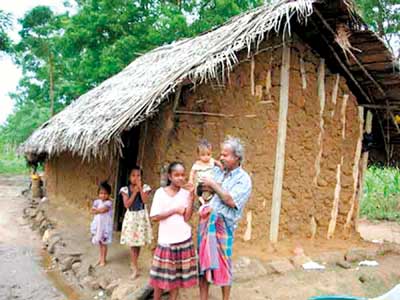Monday Feb 23, 2026
Monday Feb 23, 2026
Thursday, 18 February 2016 00:00 - - {{hitsCtrl.values.hits}}
 Sri Lanka has made encouraging progress in reducing poverty to below 7% of the population, but pockets of severe poverty remain and future prosperity will depend on addressing chronic revenue shortfalls and fostering a more competitive and inclusive economy, say new research findings announced by the World Bank Group on Tuesday.
Sri Lanka has made encouraging progress in reducing poverty to below 7% of the population, but pockets of severe poverty remain and future prosperity will depend on addressing chronic revenue shortfalls and fostering a more competitive and inclusive economy, say new research findings announced by the World Bank Group on Tuesday.
The Sri Lanka Poverty Assessment has found that the fall in poverty stems mostly from increasing labor incomes as the economy has shifted from less productive agriculture towards the industry and service sectors, more urbanisation, and rising domestic demand.
The World Bank Group carried out a Systematic Country Diagnostic (SCD) to identify the key constraints to sustaining progress in ending poverty and boosting shared prosperity. The SCD highlights that Sri Lanka has one of the lowest tax-to-GDP rates in the world, undercutting the Government’s ability to invest in education, health, and other services. Meanwhile, generating growth and jobs are constrained by protectionist policies, low foreign direct investment, a deficit of skills needed for a middle income country, and an unduly large public sector.
Addressing these issues will be critical for bringing all Sri Lankans out of poverty and ensuring a prosperous future shared by all.
Endorsing the findings of the research, Prime Minister Ranil Wickremesinghe stated: “A priority for us is the creation of more jobs that will minimise poverty and provide for prosperity for all Sri Lankans. Towards this, we need to enhance our capacity to successfully compete in global markets while creating the necessary space for investments to come in.”
The research finds that while poverty has decreased, progress is uneven across location, gender, and ethnicity. Large numbers of poor live within or close to urban areas, and there are considerably higher rates of poverty in the north and east, the estate sector, and Moneragala.
Women’s participation in the labor market has remained low for a middle income country and static for decades. Coupled with social spending that is very low for a middle income country, inequality has increased. Many people are at risk of falling back into poverty as over 40% of the population live on less than Rs. 225 per person per day.
“This new research provides an important platform of evidence and analysis to strengthen our partnership with the Government to help design policies aimed at improving job opportunities for the poor and other disadvantaged segments of the population, while promoting sustainable growth,” said Françoise Clottes, Country Director, World Bank Sri Lanka and the Maldives.
“The findings of the reports also reinforce the need to further measures aimed at improving the Government’s effectiveness, transparency, accountability and establishing strong institutions so all Sri Lankans can take part in the country’s increasing prosperity.”
The SCD explores the dynamics of how Sri Lanka’s private sector is evolving, noting the variation in the balance between public and private sector participation in the economy over the past decades. It highlights the continuing high levels of informality, which tends to dampen productivity, access to credit, and generation of good jobs.
“The findings re-emphasise the large role that the private sector can play in driving sustainable growth and the need for policies that can unleash the potential of Sri Lanka’s entrepreneurs,” said Amena Arif, IFC’s Country Manager for Sri Lanka and Maldives.
The World Bank Group comprises the International Development Association and International Bank for Reconstruction and Development, which provide financing and analytical support to governments; the International Financial Corporation (IFC), which provides financing and support services for the private sector; and the Multilateral Investment Guarantee Agency, which provides risk insurance to promote investment. It works with all stakeholders in Sri Lanka’s development through a combination of financing, policy advice, and analysis.
The Group’s activities are guided by a Country Partnership Framework (CPF) which is agreed upon with the Government of Sri Lanka; the next CPF which will shape the collaboration for the next five years is currently being finalised. The World Bank’s portfolio consists of $ 1.4 billion in financing commitments and IFC has a portfolio of private sector financing commitments of over $ 230 million.